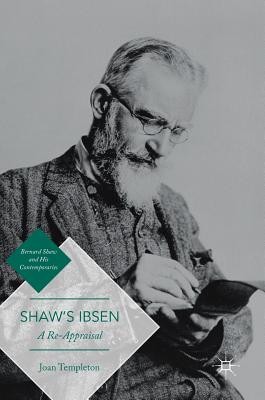
- We will send in 10–14 business days.
- Author: Joan Templeton
- Publisher: Palgrave Macmillan
- ISBN-10: 1137543418
- ISBN-13: 9781137543417
- Format: 16.2 x 21.7 x 2.6 cm, hardcover
- Language: English
- SAVE -10% with code: EXTRA
Reviews
Description
This book argues that Shaw was a masterful reader of Ibsen's plays both as texts and as the cornerstone of the modern theatre. Dismantling the notion that Shaw distorted Ibsen to promote his own view of the world, and establishing Shaw's initial interest in Ibsen as the poet of Peer Gynt, it chronicles Shaw's important role in the London Ibsen campaign and exposes the falsity of the tradition that Shaw branded Ibsen as a socialist. Further, this study shows that Shaw's famous but maligned The Quintessence of Ibsenism reflects Ibsen's own anti-idealist notion of his work and argues that Shaw's readings of Ibsen's plays are pioneering analyses that anticipate later criticism. It offers new readings of Shaw's "Ibsenist" plays as well as a comprehensive account of Ibsen's importance for Shaw's dramatic criticism, from his early journalism to Our Theatres of the Nineties, both as a weapon against the inanities of the Victorian stage and as the standard bearer for modernism.
EXTRA 10 % discount with code: EXTRA
The promotion ends in 17d.22:37:18
The discount code is valid when purchasing from 10 €. Discounts do not stack.
- Author: Joan Templeton
- Publisher: Palgrave Macmillan
- ISBN-10: 1137543418
- ISBN-13: 9781137543417
- Format: 16.2 x 21.7 x 2.6 cm, hardcover
- Language: English English
This book argues that Shaw was a masterful reader of Ibsen's plays both as texts and as the cornerstone of the modern theatre. Dismantling the notion that Shaw distorted Ibsen to promote his own view of the world, and establishing Shaw's initial interest in Ibsen as the poet of Peer Gynt, it chronicles Shaw's important role in the London Ibsen campaign and exposes the falsity of the tradition that Shaw branded Ibsen as a socialist. Further, this study shows that Shaw's famous but maligned The Quintessence of Ibsenism reflects Ibsen's own anti-idealist notion of his work and argues that Shaw's readings of Ibsen's plays are pioneering analyses that anticipate later criticism. It offers new readings of Shaw's "Ibsenist" plays as well as a comprehensive account of Ibsen's importance for Shaw's dramatic criticism, from his early journalism to Our Theatres of the Nineties, both as a weapon against the inanities of the Victorian stage and as the standard bearer for modernism.


Reviews